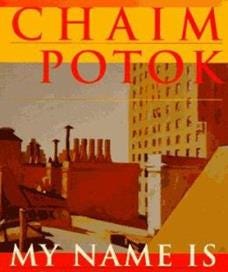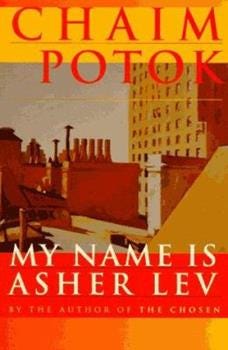I hope you all have been able to start reading My Name is Asher Lev and that you are enjoying it. I am very much enjoying my reread of it this week. I find it a beautifully written and compelling story. I wanted to pop in here not to give any full fledged ideas, but just some musings and helpful context for the book that will hopefully make your reading more informed and enjoyable!
Some Biographical Information on Chaim Potok:
Chaim Potok (1929-2002) was the son of Jewish immigrants from Poland. He was born in Brooklyn, New York (just like Asher). He grew up in an Orthodox Jewish family, but became ordained as a Conservative Rabbi (see distinctions in the Wheaton article below). He had a bachelors and masters in Literature as well as his studies at the Seminary to become a Rabbi. He was also an army chaplain for 2 years. And the tidbit that I find most interesting is that he was originally inspired to become an author after reading Brideshead Revisted by Evelyn Waugh (a previous Lit Book club pick). See the wikipedia article (above) for more specific information.
Some interesting Essays:
Chaim Potok’s Wandering Jews: Holding to Faith in a Critical Age by Wesley Hill (at Plough)
Jewish Context of My Name is Asher Lev by Michael Graves (at Wheaton College)…this one is VERY IMPORTANT to understand what Hasidic Judaism is (shoutout to Jess for finding this one!)
Marc Chagall (Wikipedia)….Asher’s uncle calls him Chagall on page 31
Some Favorite Quotes:
“Art is a lie which makes us realize the truth” - Picasso (the epigraph of the book)
“transferring the world around me to pieces of paper” (6)
“I don’t want to make pretty drawings, Mama…I don’t like the world, Mama. It’s not pretty. I won’t draw it pretty.” (28)
“I would put all the world into light and shade, bring life to all the wide and tired world.” (36)
“I lay in bed in the enveloping night and felt myself one with all the vast and endless arc of the universe, felt myself as raw flesh connected to near and distant pain…I would learn to draw my feelings of ice and darkness and a street crying.” (49)
“She was no longer a light-hearted elder sister. She had become instead an efficient organizer of the temporal traffic that governed our lives.” (54)
Some Prayers mentioned:
Krias Shema (at night)
Praised are You, Lord our God, King of the universe, who brings sleep to my eyes, slumber to my eyelids. May it be Your will, Lord my God and God of my ancestors, that I lie down in peace and that I arise in peace.
Modeh Ani (upon waking)
I give thanks before you, King living and eternal, for You have returned within me my soul with compassion; abundant is Your faithfulness!
Birkat Hamazon (grace after meals)
Some Word meanings:
-Asher: happy or blessed (which I find interesting given the book’s sad overtone)
-zemiros: sung psalm prayers at Shabbos
-shabbos: Yiddish term for Jewish sabbath
-Yah Ribbon Olom: God, master of the universe
-sitra achra: the side of impurity (or literally the other side)….in Jewish theology there is nothing in between. Everything is either on the side of holiness or the side of impurity.
-Ribono Shel Olom: means Master of the Universe, but it is a song sung in times of deep soul searching (“a haunting tune that carried with it pain and suffering and faith and hope”…pg 12)
-mashpia: a Hassidic Rabbi that isn’t a congregational leader (literally means person of influence)
Some Ideas I’m pondering:
-The difference between beauty and prettiness
-The emphasis on shadow and light
-Chaim Potok’s ability to write in a way that makes me see the world like an artist might (or at least as Asher does)
-Asher’s feeling of closeness with Reb Krinsky (the man who spend time in a labor camp in Siberia) because of suffering
Please feel free to comment here or on slack if you have anything you’d like to share with the group. I love getting to read together with you!
(Some links are affiliate links…at no extra cost to you, you can support the work I do to keep Literature Book Club running and growing by buying books from the links provided…but as always feel free to grab books at the library or at used or local bookstores as well!)





